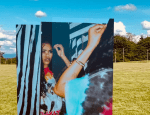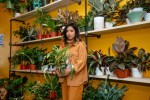“I come from an oral tradition rooted in the power of stories to transform our lived experiences,” says poet Aja Monet of her practice. “My gravitation toward poetry came from trying to make sense of the madness that is being a young Black girl in America and never feeling quite like you fit in with any specific identity.”
Monet’s journey to poetry began in the classrooms of her native Brooklyn, where she was born and raised, after an early childhood spent in Miami. The 32-year-old eventually graduated from the pages of her lined notebooks in East New York to the stages of the Lower East Side. In the process, Monet refined the contemplative and evocative style of political performance poetry that has become her signature. In 2007, at 19 years old, Monet became the youngest performer to ever become the Nuyorican Poets Café Grand Slam Champion. Also active in the political scene, she was a vocal member of Justice League NYC.
Eventually, her partner’s job and a personal yearning to reconnect to her Caribbean roots and the Atlantic Ocean led her back to the Magic City, where she is currently based and participates actively in the community. Inspired by June Jordan’s “Revolutionary Blueprint”, Monet facilitates poetry and community leadership workshops called Voices: Poetry for the People alongside Community Justice Project and works closely with intersectional abolitionist collective Miami Dream Defenders. Her workshops and readings have continued in spite of COVID-19.
“Art was a way that I felt like I could speak and was being heard and affirmed,” she says. “I was fascinated with what language could do… it has this shamanistic quality to it, and I think as a kid I didn’t understand that it was a Black radical tradition that I was being initiated into.”

Remezcla spoke to Monet about her poetic organizing practice, as well as the eternal work of decolonizing our imagination through art, and crafting new imagery for a better world. The interview has been lightly edited and condensed for clarity purposes.
There’s been a pandemic of White colonial patriarchal terrorism that Black people and Indigenous people have had to endure
How has the move to Miami from New York affected your work?
Miami is near the water and there’s sunshine nearly every day. My family comes from the Caribbean, so there was a sort of appeal like, this is what I need at this phase of my life. I lived here until when I was about four or five, so a lot of those memories of being around sun and water and palm trees and beaches are in the treasure box of my consciousness. I remember the air here so vividly as a kid. Coming back here was about some sort of divine synchronicity. I needed to be around the Atlantic and have some sort of grounding back to that aspect of my ancestry. I discovered a lot about myself and my next collection of poems is a lot about what I learned and what I’ve uncovered while being in Florida and organizing in the community here.

How has the shift to digital since COVID-19 affected your experience with curating virtual healing art spaces?
I don’t have any complaints. It’s been very healing and powerful and transformational. Creating “Homemade” was about trying to offer literal remedies but also metaphorical medicine that would spiritually and mentally feed people during this time. It’s been a gift to be able to offer it for everyone who participates in addition to people who watch.
Miami is the rare example of a majority Latinx American city, and there’s a large population of White Latinxs who are flagrantly Anti-Black and comfortable in their majority privilege. How do you think non-Black Latinxs can best engage with this conversation without taking up space?

They have a lot of work to do, and the first thing would be being committed and invested in growth and transformation. There has to be some reckoning and honest admittance to naming the harm that has been done against Black and Brown people across the globe. People have to acknowledge that and do whatever is right to attempt to rectify these harms. Honestly, I don’t spend a lot of time trying to convince White Latinxs of what they should be doing. Miami is very segregated. You can go without having to engage or interact with people who think differently and live differently and move differently than you—they don’t have to ever engage someone who’s protesting Downtown or a Black person who’s homeless living on the side of a library. They don’t ever have to face that because they pay good money to not have to face it. There’s a reality around race, but I think we have to have a deeper conversation around class, because they’re interconnected and Latinxs being able to afford mansions and create their own enclaves and literally never have to face other human beings that don’t agree with them or think like them is more of a testament to capitalism than anything, and racism is inherently a capitalist project. If you think about it historically, back to the colonization of the lands of Miami, then you know Black and Indigenous people have historically endured the privatization of property and the exploitation of lands by virtue of White terrorism since the founding of this country. The history of Florida, for one, omits its relationship with the Maroon communities and Indigenous and Black peoples camaraderie and solidarity in fighting White terrorism. There were protests called “Wade-Ins” where, instead of a sit-in, people would literally sit in the water and protest not being able to go to the same beach as White people.
The COVID-19 pandemic is a virus that has harmed people across the world, but there’s been a pandemic of White colonial patriarchal terrorism that Black people and Indigenous people have had to endure long before it arrived and will stay long after.
A big part of our practice has to be learning to create sacred time for us to listen and be in tune with whatever comes to us.
Earlier in our conversation, you spoke of the importance of truth-telling in your poetry… with so much information flying around, it can feel hard to write or perceive the truth. How do you personally connect to your poetic abilities and energies in this time, and how can everyday people and artists connect to poetry and art that comes from within as we’re bombarded by outside forces?

The human spirit is powerful. We have survived insurmountable conditions, and this is no different. We are capable if we step into the courageous power of our perspectives and lean on the legacy of those who came before us and wrote before us and loved before us and struggled before us. There will be those who will write after us and who will love after us and who will struggle after us, hopefully in entirely new struggles or different struggles. Writing is a resilience practice, a way that we learn to broaden the interior landscapes of our lives and to manifest the world we want to see. It’s spellcasting as much as it is truth-telling, with the capacity to conjure and awaken the universe within us.
A big part of our practice has to be learning to create sacred time for us to listen and be in tune with whatever comes to us. Doesn’t mean that whatever comes to us is necessary to share right now or that it’s so urgent to put out into the world, but sometimes we are given messages that are vital to our day to day survival. If you come to your ancestors or your muse with a specific request or a specific ask, and you say ‘what do the people need to know right now, what are the things that are useful for us to persevere,’ that’s a very different intention then when you come to your page and you say, ‘What do I have to say? How do I say it? How can I reach as many people? How do I get people to agree with me?’ Those are very different energetic approaches to the work and your intention will always be revealed.
Learning to be guided by the practice is part of every writer’s journey. Learning to have a practice rooted in a tradition, legacy, and in community with others is really important because even in solitude, you are among the many voices that came before you. Harnessing that knowledge is crucial for our survival especially as we write, as we live, as we love. We have to tap into our ancestral wisdom and our genetic memory for the words and the signals and the actions to carry us forward. If we don’t listen to that, we start to become caricatures of ourselves and we start to really fight with ourselves about writer’s block or not, or whatever. I think every moment in history and every moment in one’s life demands new callings. You have to meet the moment where it is and prepare for whatever is to come. No matter what craft you participate in, you learn the urgency of that craft by doing it. I think writers are going to learn what words are necessary now and what words aren’t by virtue of writing, and if they don’t have the words then they will find another way. We all have multiple skill sets we can offer to society and to one another during this time.

We all have multiple skill sets we can offer to society and to one another during this time.
Now more than ever we’re not limited by medium.
Exactly! We are not limited by genre or identity brackets or marketing terms that capitalism has forced us into. You don’t say, ‘I’m an artist, and I’m only an artist’ or ‘I’m a painter and I’m only a painter,’ ‘I’m a soccer player, I’m only a soccer player,’ ‘I’m a basketball player, I’m only a basketball player’—we all contain multitudes. We all have the capacity to evolve, change, transform, move, and be in movement with one another. Learn what is necessary and what your skillsets are by practicing them and by committing to them and engaging in them. Figuring out what works for you and how you can contribute in this moment is crucial for us to move collectively in a direction that gets us closer to a harmonious life. I’m growing in this time and expending and expanding as much as the next person. Learning to be still and compassionate with yourself and to have compassion with yourself, is the beginning to creating the alternative world we want to see.
There has to be a level of imagination to see the new world.
When we talk about abolition, it’s a decolonizing of our imagination. It’s not so much about what we’re against, it’s really trying to reimagine what are we truly for? What do we want to see in the world? What are we willing to invest in? Who do we see ourselves with when we’re free? And how do we pull more people into that vision?
Stream past “Homemade” shows on the 1st and 15th of every month, and learn more about Aja Monet’s work on her website.




